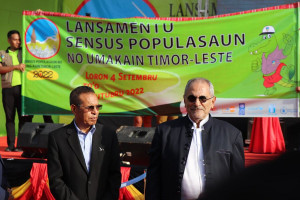Campaign launch for the 2022 Census

The 2022 National Population and Housing Census campaign was officially launched today, August 15th, by the President of the Republic, José Ramos-Horta and the Prime Minister, Taur Matan Ruak, in a ceremony held at the Dili Convention Centre.
The 2022 Census, to be held between September 4th and October 5th, throughout the territory, will be the fourth in Timor-Leste, following those held in 2004, 2010 and 2015.
The main objectives of the General Housing and Population Census are to count and characterise the population residing in Timor-Leste, as well as to survey the existing dwellings and their habitability conditions, through the exhaustive collection of elements and data, carried out through survey operations and statistical treatment.
All households in the 13 municipalities and the Special Administrative Region of Oé-Cusse Ambeno ( RAEOA) will be visited from September 4th by teams of enumerators, specially trained for this purpose, who will be responsible for data collection. A total of 3,424 persons have been hired by the General Directorate of Statistics for the implementation of this initiative. These teams are bound by professional secrecy and the data collected is anonymous, meaning that it will not be associated with the names of any family or person. All enumerators will be duly identified.
In his welcome message, the Minister of Finance and Vice-President of the National Population and Housing Census Committee, Rui Augusto Gomes, underlined that “Prime Minister, Taur Matan Ruak, has often stated that the development priority of the 8th Constitutional Government is people. To achieve well-being and progress, human capital is the most important. Therefore, we need to have correct and up-to-date information about our society, at the local level and the national level. For example, when the majority of the population of an administrative post is made up of babies and children, public policies have to be oriented towards the construction of pre-schools”.
The Minister explained that the objective of the 2022 Census is to “collect information to know correctly what the structure of the population is up to the level of the village (Suco) and hamlet (Aldeia). For example, how many young or how old the population is, how many women and how many men, how many babies and children, how many people with disabilities and data about the population that lives in the city or rural areas".
Minister Rui Gomes also expressed his belief that “with the involvement of the President of the Republic, the National Parliament, the religious leaders, and the entire civil society, this National Population and Housing Census will be a success”.
In the 2022 State Budget, the Government has allocated US$ 3.1 million for the implementation of this activity. The 2022 Census also has the financial support of several UN agencies: the UN Population Fund contributed US$ 777,300, the UNICEF, US$ 56,000, the UNDP, US$ 25,000, the UN Women, US$ 24,000, and the World Food Programme, US$ 20,000.
The 2022 Census was supposed to be held in 2020, but budgetary constraints in 2020 caused by the duodecimal regime operation and the circulation restrictions imposed by COVID-19 prevented its realisation.
In March 2022, the Council of Ministers approved the Government Resolution No. 14/2022, of March 23rd, establishing the administrative structure responsible for conducting the National Population and Housing Census 2022, consisting of three committees, the 2022 Census National Committee, chaired by the Prime Minister, the 2022 Census Technical Committee, chaired by the Director General of Statistics, Elias dos Santos Ferreira and the 2022 Census Publication Committee.
The launching ceremony was also attended by members of the 8th Constitutional Government and the National Parliament, the diplomatic corps, development partners, Presidents of Municipal Authorities and Administrative Post Administrators, community leaders, religious leaders, academics, and the private sector representatives and journalists.










































